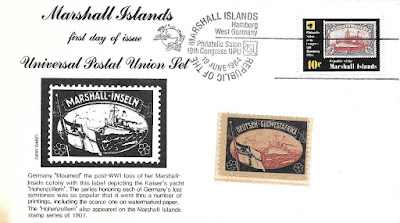Flags in Grief:
Flags at Half-Mast, Flag draped Caskets & Funeral Cortege.
Flags at Half-Mast, Flag draped Caskets & Funeral Cortege.
Flag at Half-Mast or Half-Staff
The
origin of the custom of lowering a flag
at ‘half-mast’ to indicate mourning is a little unclear. Its observance appears to date back to the sixteenth century, as a
custom of the sea, which has spread to the land and became universal. A sailors superstition perhaps, the flag of mourning is flown at half-mast to leave space for death’s imaginary flag to be flown
above it. It is a sign that death has
conquered, and that the invisible flag of the death is flying over the lowered
colours of the vanquished.
The earliest record we have of the lowering of a flag to signify a death
was an occasion in 1612, when the
Master of the 'Hearts Ease', William
Hall, was murdered by Eskimos while taking part in an expedition in search of
the North West Passage. On rejoining her consort, the vessel's flag was flown
trailing over the stern as a mark of mourning. On her return to London, the 'Hearts Ease' again flew her flag over
the stern and it was recognised as an appropriate gesture of mourning.
World's First stamps showing a Flag at Half-Mast: Burma 1948
Issued to commemorate the anniversary of the assassination of Burma's leaders in the fight for independence.
Issued to commemorate the anniversary of the assassination of Burma's leaders in the fight for independence.
In the United
States, the earliest reference to half-staff, or half-mast, occurred in 1799. All Navy vessels were ordered by
the Navy Department to fly the American flag at half-mast when George Washington died.
A further sign of mourning is to attach black ribbons tied as a bow to the top of the flag. If mourning is to be observed in a parade or procession, where a flag is carried, two streamers of black crepe are attached to the spearhead, allowing the streamers to fall naturally. The use of black crepe in such a manner shall only be by an order of the government.
Flag Code of India stipulates ‘Half-mast is meant hauling down the Flag to one-half the distance between the top and guy-line and in absence of the guy-line, half of the staff’. To achieve this position the flag should be first hoisted to the peak for an instant and then slowly lowered to the half-mast position, but before lowering the Flag for the day, it shall be raised again to the peak.
A further sign of mourning is to attach black ribbons tied as a bow to the top of the flag. If mourning is to be observed in a parade or procession, where a flag is carried, two streamers of black crepe are attached to the spearhead, allowing the streamers to fall naturally. The use of black crepe in such a manner shall only be by an order of the government.
Flag Code of India stipulates ‘Half-mast is meant hauling down the Flag to one-half the distance between the top and guy-line and in absence of the guy-line, half of the staff’. To achieve this position the flag should be first hoisted to the peak for an instant and then slowly lowered to the half-mast position, but before lowering the Flag for the day, it shall be raised again to the peak.
Here is a selection of Postage Stamps showing Flags at Half-Mast from across the World.
Flag Draped Caskets
At the time of mourning Flags are draped over the coffins of national heroes. The association of flags with funerals began centuries ago when caskets of Royalty was decorated with symbols of authority.
Guarding Nelson’s Body
Lord Nelson (1758 – 1805) English naval commander who died during the Battle of Trafalgar (1805) in the Napoleonic Wars.
Perhaps, World's First Stamp Depicting
Funeral Scene is on Atahualpa: Peru 1918
In the post-independence India, the first
National State Mourning was observed when Mahatma Gandhi, the father of the
nation died on January 30, 1948.
New Delhi 31 the most immediate the most
immediate His Highness Nawab Balasinor. Government of India regret Mahatma Gandhi was victim
of shooting outrage. Gandhiji expired yesterday evening. Cremation will take place Saturday 4 P.M.
Prime minister has broadcast Saturday 31st be observed as day of fasting and prayer
suggest offices should close entirely and flags half mast from sunrise =
Funeral Cortege
“cortege” is the procession when the coffin is transported to or from the ceremony - and this is done “in style”, with a elegant hearse (car or horse-wagon) and some cars with the family and guests following (or the guests might also be walking by foot).
In State funerals in the United States, a Caisson (a two-wheeled ammunition wagon), is used in place of a gun-carriage.





















